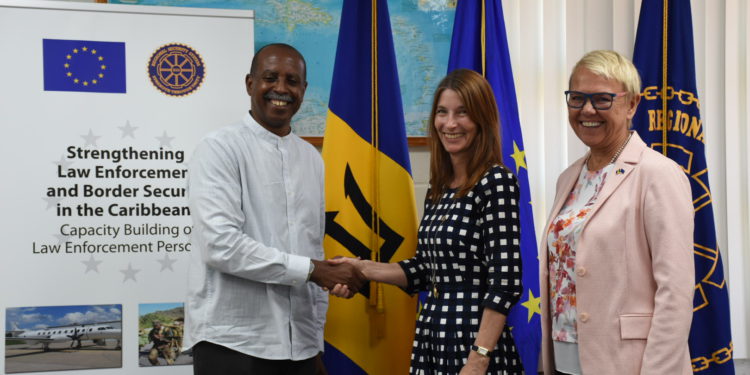As part of her visit to the region, Deputy Secretary General (DSG) for Economic and Global Issues of the European Union’s External Action Service (EEAS), Ms Helena König, visited the Regional Security System (RSS) Paragon Headquarters Base, Barbados on 14 March.
The RSS and the EU recently renewed their partnership, signing a cooperation deal that will allow for the delivery of six training modules to RSS member states’ law enforcement and border security personnel. The project will also include the rollout of a full-scale field training exercise at sea in St. Lucianext year. The RSS has benefitted from EU support since 2016, with the aim of strengthening the organisation’s capacity to respond to transnational crime threats.
DSG König said: “The European Union is committed toassisting its security partners in the Caribbean. Fighting transnational organised crime is a common priority for our regions, as consequences of the illicit trade of drugs and firearms are felt on both sides of the Atlantic. I am delighted to officially launch our new partnership with the RSS, and I am sure that the training programmes will provide officers with additional skills to combat crime and terrorism in the maritime and land domains.”
Executive Director of the Regional Security System, Commodore Errington Shurland, welcomed the EEAS DSG to the Paragon Base and presented the organisation and its activities to the European guest: “The Regional Security System has enjoyed an extremely rewarding partnership with the European Union. The new partnership with the European Union, seeks to build on our previous cooperation in strengthening institutional capacities to respond to common factors in our criminogenic environment. It is expected to foment our capacity to manage transnational organised crime in a realistic way with capacity-building programmes aimed at operational planning, intelligence analysis, counter-terrorism tactics, polygraph examinations and the full-scale exercise to test the RSS response mechanism in addressing organised crime. This slew of interventions will ensure that the RSS Membership will be provided with an opportunity to build further capacity in designing and executing effective inter-agency operations in response to transnational organised crime,” Commodore Shurland affirmed.
In addition to the RSS, DSG König also visited the Queen Elizabeth Hospital in Barbados, which is currently benefitting from EU support to its digitisation. She also met withBarbados Minister of Foreign Affairs and Foreign Trade, Kerrie Symmonds; Minister in the Ministry of Foreign Affairs and Foreign Trade Sandra Husbands; Minister of the Environment Adrian Forde; and President of the Senate Reginald Farley.
While on this visit DSG König travelled to St.Vincent and the Grenadines to discuss ongoing work with Prime Minister Ralph Gonsalves and the CELAC coordinating team in preparation for the upcoming EU-CELAC summit in Brussels (17& 18 July).
DSG König will continue her visit by travelling on to Guyana and Suriname this afternoon.
Background
The support to the RSS is part of a wider European Union engagement on security matters in the Caribbean. The EU is currently cooperating with and will assist the CARICOM Implementing Agency for Crime and Security (IMPACS) on the detection and investigation of cybercrimes, and will assist the Agency in acquiring technical equipment and software that will more thoroughly track passengers and cargo. Trans-regional programs such as AIRCOP and SEACOP continue to help countries in the region boost their capacities in the fight against illicit flows.
In addition, a 48-month programme on criminal justice reform,implemented by UNDP and financed by the EU, has recently been agreed on. The programme will assist eight countries in the Eastern Caribbean in their efforts to reduce case backlogs by the provision of IT solutions and qualified expertise. Caribbean countries will also be eligible for the next phase of EL PAcCTO, the international cooperation programme funded by the European Union that seeks to contribute to security and justice by supporting the fight against transnational organised crime. Prior to this, the Programme was limited to Latin American countries. Its extension to Caribbean countries will contribute to strengthening operational contacts among beneficiary countries.









